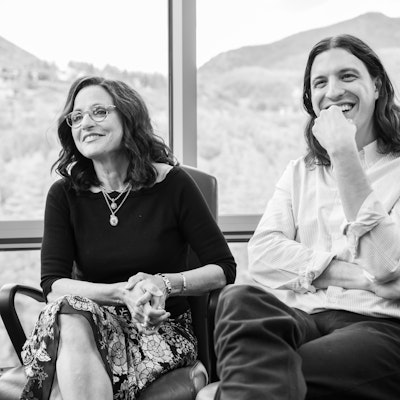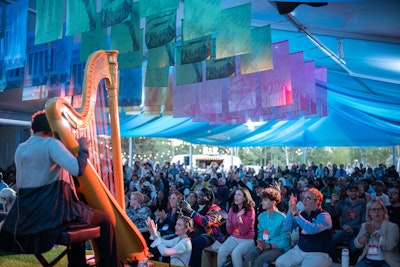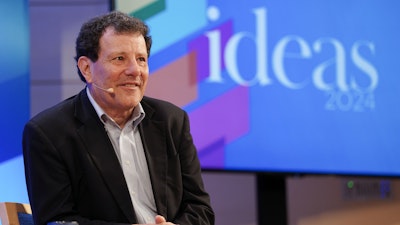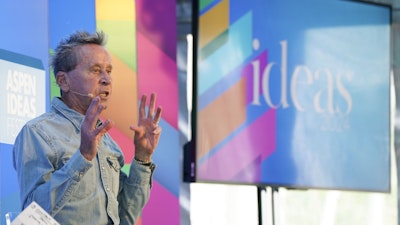
How to Dance in Ohio: Celebrating Neurodiversity
Setup
The Broadway musical “How to Dance in Ohio” is the true story of a group of young people with autism preparing for a formal dance. Based on a documentary of the same name, the autistic characters are played by autistic actors in a musical celebration of neurodiversity and the universal need for connection. “If you’ve met one autistic person, you’ve met one autistic person,” says one actor, suggesting that the audience not generalize about the diagnosis. By representing themselves on stage, “How to Dance in Ohio” also reminds people that there’s room for everyone on the Broadway stage and beyond.
Speakers
-
 Desmond Luis EdwardsActor in “How to Dance in Ohio”
Desmond Luis EdwardsActor in “How to Dance in Ohio” -
 Emilio AmigoPsychologist and Clinical Director of Amigo Family Counseling
Emilio AmigoPsychologist and Clinical Director of Amigo Family Counseling -
 Elizabeth CohenMedical Journalist
Elizabeth CohenMedical Journalist -
 Madison KopecActor in “How To Dance In Ohio”
Madison KopecActor in “How To Dance In Ohio” -
 Conor TagueActor in “How to Dance in Ohio”
Conor TagueActor in “How to Dance in Ohio” -
 Collin HancockActor in “How to Dance in Ohio”
Collin HancockActor in “How to Dance in Ohio” -
 Ayanna ThomasActor in “How to Dance in Ohio”
Ayanna ThomasActor in “How to Dance in Ohio” -
 Marina JansenActor in “How to Dance in Ohio”
Marina JansenActor in “How to Dance in Ohio”
Explore More
Education


Julia Louis-Dreyfus has kept us laughing for years in her roles as Elaine Benes in “Seinfeld” and Selina Meyer in “Veep.” But her most recent work has her shifting from comedy...


It’s a tough time to try and express the complexity of life honestly. Writer Chimamanda Ngozi Adichie doesn’t shy away from truth-telling and believes we should all step up an...


Creativity is as intrinsic to our species as any of our basic instincts, says Debbie Millman, designer and curator. But for millions of people in the United States, the abilit...


The entertainment industry has had to pivot and refresh time and again to adapt to constant changes in format, business models and attention spans. Somehow, producer Brian Gra...


Millions of children across America don’t have art classes in school and don’t grow up going to art museums and galleries. They might be hours away from the closest museum, or...


Young people in America are struggling. The causes are varied and may not be entirely clear, but the results are unfortunately unmistakable. Many of our youth feel lonely, iso...

October is National Book Month, and we’re celebrating by looking back at some of our favorite conversations about reading and writing from the Aspen Ideas Festival and Aspen I...

Jump in by watching our 15 most popular talks of all time. From black holes to jazz and civil rights to psychology hacks, we've collected the talks that remain audience favori...

Finding the national and global headlines understandably bleak lately? Whether you need mental distraction or stimulation, engross yourself in compelling topics and get a gli...

Today's kids are coming of age against a backdrop of political, social, technological and economic upheaval. While these circumstances are shaping a precocious generation that...

The arts are not just forms of expression, but powerful forces that shape culture and the human experience, both reflecting and influencing our world. Join renowned artists, w...

As one of the foremost reporters of his generation, Nicholas Kristof has been witness to century-defining events and atrocities around the world. How has he managed to weaponi...


In “Mindset Matters,” Daniel R. Porterfield advances the argument for the value of undergraduate education and suggests ways to improve education for new generations. Three co...

Amid seismic shifts in the entertainment world, Oscar-, Golden Globe- and Emmy-winning Brian Grazer has managed to keep pivoting to new ways to tell stories in movies, TV and...

In the last 30 years, conglomerates from Amazon to Netflix to Spotify have changed the way we interact with media, books, fashion and music. Creatives are struggling to mainta...

Images communicate truths, and also lies. Learning to pay attention to photographs can help us discern. An art and cultural historian and a visual artist host a master class o...

Hurray for the Riff Raff is more than Alynda Segarra’s musical moniker; they spent their youth hopping trains across America, capturing that life in youthful poetry then and a...

When people in prison are given creative outlets, the impact is life-changing. Hear from a hip-hop artist setting up prison recording studios, an architect designing more huma...

The Walton Family Foundation’s latest research with Gallup shows that young people need a sense of purpose in school and work to feel happy—and the right adult mentors and gui...








